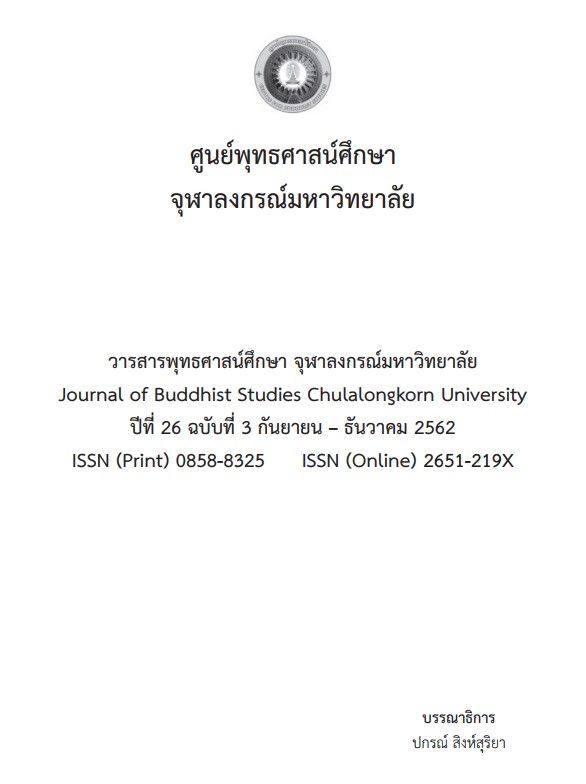The Application Model of the Principle of 38 Blessings of Life in Thai Society
Keywords:
Blessings of Life, applications of the 38 Blessings of Life, life in Thai societyAbstract
The 38 Blessings of Life are composed of a diversity of the Buddha Dhamma, both in terms of contents and levels. Scholars hold different views concerning their applications, and some Buddhists simply misunderstand some of these Blessings. Therefore, in order to be able to apply the 38 Blessings to one’s life more fruitfully and in accordance with the Buddhist principles, this research article seeks to present a useful model for doing so, one that is appropriate for the present situation in Thai society.
The resulting application model of the 38 Blessings of Life for Thai society consists of basic principles, objectives, criteria, and methods of application. According to this model, Thai Buddhists should follow the basic principles of the Blessings, not in ascending order, but by choosing appropriate themes and practicing in a holistic manner, covering the blessings of all levels. The practitioner should focus both on the main objective – Nibbāna – and the secondary objective desired for this life. She/he may also use diverse criteria in selecting the Blessings for practice, such as one’s capabilities, thereby increasing the likelihood of a successful practice. As for the methods of practice, Buddhists may follow all of the 38 Blessings of Life, including those of higher levels, by adapting them to contemporary happenings.
Downloads
References
มหามกุฏราชวิทยาลัย. (2525). พระสูตรและอรรถกถาแปล. กรุงเทพฯ : เฉลิมชาญการพิมพ์
ชัยวัฒน์ อัตพัฒน์. (2534). หลักพุทธศาสนา. กรุงเทพมหานคร : มหาวิทยาลัยรามคำแหง
ปิ่น มุทุกันต์. (2535). มงคลชีวิต. กรุงเทพมหานคร : มหามกุฏราชวิทยาลัย
พ.สถิตวรรณ. (2547 ก). อุดมมงคลในพระพุทธศาสนา เล่ม 1. กรุงเทพฯ: ชวนพิมพ์
พ.สถิตวรรณ. (2547ข). อุดมมงคลในพระพุทธศาสนา เล่ม 2. กรุงเทพฯ: ชวนพิมพ์
พระมหาสมชาย ฐานวุฑฺโฒ. (2558). มงคลชีวิต ฉบับ "ทางก้าวหน้า". กรุงเทพฯ: รุงศิลปการพิมพ์
พระมหาวีระ ถาวโร. (2519). มงคล 38 และอุทุมพริกสูตร. กรุงเทพฯ : ชวนพิมพ์
ภัทรพร สิริกาญจน. (2540). จริยธรรมกับบุคคล. กรุงเทพฯ: โรงพิมพ์คุรุสภา
สมดี จินดาพิษฐาน. (2555ก). มงคลชีวิต 38 ประการ ฉบับห้องสมุด เล่ม 1. กรุงเทพฯ : อุษาการพิมพ์
สมดี จินดาพิษฐาน. (2555ข). มงคลชีวิต 38 ประการ ฉบับห้องสมุด เล่ม 2. กรุงเทพฯ : อุษาการพิมพ์
ประโยชน์ ส่งกลิ่น. (2545). “การศึกษาวิเคราะห์กระบวนการของการพัฒนาตนตามแนวคำสอนในมงคลสูตร”. วิทยานิพนธ์ศิลปศาสตรมหาบัณฑิต. สาขาวิชาพุทธศาสนศึกษาบัณฑิตวิทยาลัย มหาวิทยาลัยธรรมศาสตร์
พระธรรมกิตติเมธี (เกษม สญฺญโต). (Ph.D). อดีตรองอธิการบดีฝ่ายวิชาการ มหาวิทยาลัยมหามกุฏราชวิทยาลัย. สัมภาษณ์, 8 สิงหาคม 2561
พระเมธาวินัยรส (สุเทพ ปสิวิโก). (ผศ.ดร.). รองอธิการบดีฝ่ายบริหาร มหาวิทยาลัยมหามกุฏราชวิทยาลัย. สัมภาษณ์, 10 ตุลาคม 2561
รองศาสตราจารย์ ดร.ประเวศ อินทองปาน. อาจารย์ประจำภาคปรัชญาศาสนา คณะมนุษยศาสตร์ มหาวิทยาลัยเกษตรศาสตร์. สัมภาษณ์, 14 ตุลาคม 2561
รองศาสตราจารย์ ดร.ผจญ คำชูสังข์. อดีตอาจารย์ประจำภาคปรัชญาศาสนา คณะมนุษยศาสตร์ มหาวิทยาลัยเกษตรศาสตร์. สัมภาษณ์, 16 ตุลาคม 2561
รองศาสตราจารย์ ดร.ทองหล่อ วงษ์ธรรมมา. อดีตอาจารย์ประจำภาคปรัชญา คณะ มนุษยศาสตร์และสังคมศาสตร์ มหาวิทยาลัยราชภัฏพระนคร. สัมภาษณ์, 20 ตุลาคม 2561
Downloads
Published
How to Cite
Issue
Section
License
บทความที่ได้รับการตีพิมพ์เป็นลิขสิทธิ์ของศูนย์พุทธศาสน์ จุฬาลงกรณ์มหาวิทยาลัย
ข้อความที่ปรากฏในบทความแต่ละเรื่องในวารสารวิชาการเล่มนี้เป็นความคิดเห็นส่วนตัวของผู้เขียนแต่ละท่านไม่เกี่ยวข้องกับศูนย์พุทธศาสน์ จุฬาลงกรณ์มหาวิทยาลัย และคณาจารย์ท่านอื่นๆในมหาวิทยาลัยฯ แต่อย่างใด ความรับผิดชอบองค์ประกอบทั้งหมดของบทความแต่ละเรื่องเป็นของผู้เขียนแต่ละท่าน หากมีความผิดพลาดใดๆ ผู้เขียนแต่ละท่านจะรับผิดชอบบทความของตนเองแต่ผู้เดียว






